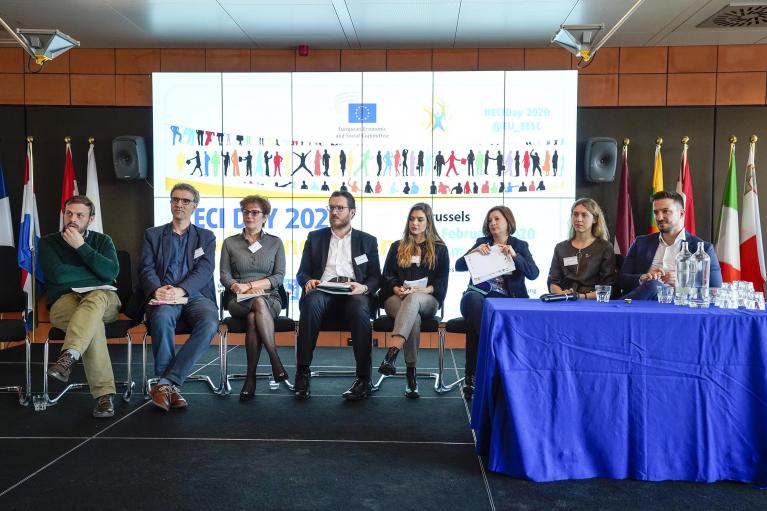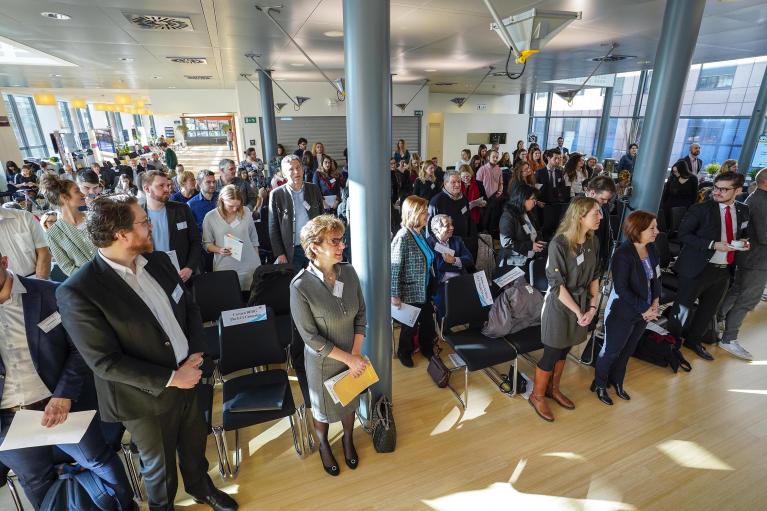ECI Day 2020 – what will the future hold for the European Citizens’ Initiative?
On 25 February 2020, the 9th edition of the ECI Day took place: ECI organisers, citizens, civil society organisations, researchers and policymakers got together to discuss the past present and future of the European Citizens’ Initiative, less than two months after the new regulation had come into application. Not only was there a fundamental discussion about the merits and limitations of the instrument, participants also debated and voted on a number of recommendations for improvement of this instrument! Find out more!
The ECI Day is the annual gathering for ECI organisers, citizens, civil society organisations, researchers and policymakers to exchange, connect and reconnect around the issue of common concern: the future of the European Citizens’ Initiative, the world’s first and only transnational participation instrument. ECI Day 2020 was organised by the European Economic and Social Committee in collaboration with Democracy International, the European Citizen Action Service (ECAS), the European Committee of the Regions, The ECI Campaign and Bertelsmann Stiftung. The event took place less than two months after the new regulation on the European Citizens’ Initiative came into application on the 1st of January 2020.
Image credit “@EU2020 – source: EESC"
The first part of the event allowed participants to draw lessons from their experience with the ECI up until today. Additionally, the goal was for people to share and discuss their hopes and expectations for the future of the instrument going forward under the new regulation and beyond. Right from the start a vast majority of the participants stated that the newly introduced regulation is an improvement over the original one. Nonetheless, the speeches and exchanges that followed showed: the ECI can and must do better.
A central point of discussion was the question of ‘success’: what makes an ECI successful? Pablo Sanchez, organiser of the first-ever successful ECI “Right2Water” reflected on this: „Success must not be defined by the Commission – it must be defined by the organisers.” In her speech, Olga Kikou, representative of ECI “End The Cage Age”, expressed what she counts as ‘success’: “If we manage to get animals out of cages, then the ECI would have been worth all the immense effort.” ECI “End The Cage Age” has also been successful at meeting the signature threshold but is still waiting for the examination procedure.
Following the expression of dissatisfaction with the follow-up on successful initiatives, a more general discussion on how to improve the impact of this instrument took place. Some of the participants argued that the core problem is the fact that the ECI is addressed at the European Commission: “As long as [the ECI] stays in the hands of the Commission, unfortunately it will not bring any real success.” In order to change this, proposals were made for the European Parliament to get more involved: to hold plenary debates and votes on all successful initiatives. Furthermore, participants and speakers argued that a possible future right of initiative of the Parliament should be shared with the citizens, by means of the ECI. Beyond the role of the European Parliament, attention was also drawn to the role of the Member States and their parliaments. Assya Kavrakova, Director of ECAS, encouraged national parliaments to hold debates on running initiatives even before they reach the signature threshold. Lastly, Daniela Vancic, European Programme Manager for Democracy International, built the case for the ECI to be upgraded to an instrument of direct rather than participatory democracy. She argued that, in the future, successful organisers should be allowed to start a second round of signature collection if they are unhappy with the response on their initiative by the EU institutions. If they would be successful in this second round of signature collection as well, a binding EU-wide referendum would need to be organised. Daniela’s reform proposal was supported by over 60% of the participants of the ECI Day, but would require treaty change in order to be implemented.
Image credit “@EU2020 – source: EESC"
Another challenge that was discussed is the lack of visibility of the instrument. The Commission’s communication campaign on the ECI was welcomed, and deemed necessary, but insufficient: Carsten Berg, Director of The ECI Campaign, argued that the ECI will only become significantly more well-known once there is a true success story – once people observe the impact this instrument can make on EU politics and policy-making.
Many more issues were brought up throughout the morning session: the opportunity that the ECI holds for involving young people in the political process, in particular if the minimum age for signing an ECI were to be lowered to 16 in all EU countries; the differences in political cultures and national histories across the EU which explains why it is easier to convince citizens to sign an ECI in some parts of the EU and not in others; and the opportunity that the planned two-year Conference on the Future of Europe offers for the ECI to become more publicly known.
While many of the discussions about the challenges facing the instrument are not new, the only way for the ECI to have a chance at revival is if people continue to care about its fate. If anything, this edition of the ECI Day was proof that there is still a community of people that care for the ECI, and that it continues to grow.
In case you are interested in reading the ECI Day 2020 recommendations for the future of the ECI – formulated on the basis of speaker input, and voted upon by the participants – please take a look here!
Contributors
Maarten de Groot , Christian HuesmannMaarten de Groot and Christian Huesmann are project managers in the Future of Democracy Programme of the Bertelsmann Stiftung. Maarten was a moderator of the morning session of ECI Day 2020 and Christian was a speaker.
Get in touch with them on the European Citizens’ Initiative Forum !






Leave a comment
To be able to add comments, you need to authenticate or register.